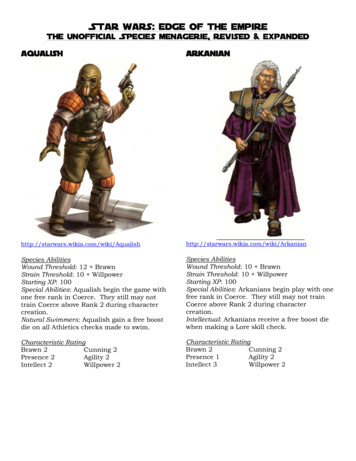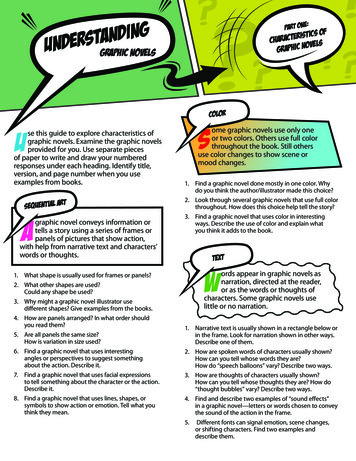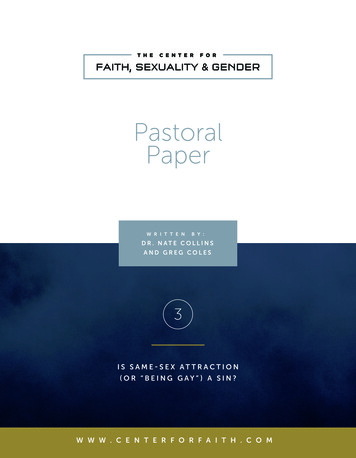
Transcription
Deceit, desire and the graphic novelWatchmen in the age of terror
Being human, we are able to characterize ourselves as highly "dependent creatures". Thisdoesn't mean, however, that we are always willing to use this capacity. On the contrary, theawareness of being dependent on something or someone other than ourselves often seemsto frighten us. We like to think of ourselves as free, "in-dependent" individuals. Still, eventhe perk skinny man with the tip-tilted nose who's writing this essay had to finally admitthoughts like these were mere illusions. I must confess something: in a not so distant past Iwas convinced I had the sanctified right to do with my body whatever I wanted, and I triedto "improve" it. After all, I was a free, emancipated western individual – so I thought. Inwanting to change myself into a shiny action hero type of figure I remained blind, of course,to the fact I didn't actually create the body I was manipulating. I was not my own origin.Moreover, the body I was desiring for myself apparently didn't spring from my "own"imagination. It was running around, lifting weights and sweating to smelly conclusions in theworkout center I was attending. I was not my own destination. To my great relief Ieventually came to realize that we were all inefficiently exchanging bodily odors in the gym.My attempt at being a strong, autonomous man surely was bound to end up in vain. I simplywasn't independent. I could desire being totally free though. In the end, however, that'sexactly what an aspiration for complete freedom is and what it remains: a desire.In most instances a desire becomes more intense as its pursued goal becomes moredifficult to obtain. With regard to the desire for being a self-sufficient independentindividual this principle might take the form of a stubborn, even vehement denial: the moreI become aware of not being my own origin, the more I might want to establish theopposite. In doing so I unwittingly confess I'm reacting out of and against a given that wasalready there, "before" me: the fact of my existence, what German philosopher MartinHeidegger called Geworfenheit ("throwness").1 We are always already depending on thisfactual reality which – we could therefore say – "transcends" us. So we literally are,ontologically speaking, "dependent beings". Our self is a non-autonomous self. It is presentto itself as an unascertainable given2 – as a "present" with certain, limited possibilitiesprecisely because of its non-self-sufficient character. Of course I could want to change mytip-tilted nose, but I would still change the nose that was already there without any decisionon my behalf. The prospect of painful surgery, but most of all the loving companionship of awife who's dearly accepting my somewhat "nerdy" features, persuaded me not to gothrough with the plans to "re-create" myself. Besides, didn't Socrates have a tip-tilted noseas well?Comforting myself with the image of Socrates, and thanking my wife she didn'texpect me to become the next Hercules, I realized the following: not only are we dependenton a self as a given with limited possibilities, but also the way we look at ourselves and whatwe desire from and for ourselves within these possibilities is highly dependent on the wayothers are watching us. Or at least on the way we think others are watching us. We are verymuch aware of being watched. Actually, we are constantly watching others watching us. Toput things slightly differently: we imitate each other's watchfulness. We are "watchmen".
3Not long ago I discovered Deceit, Desire, and the Novel: Self and Other in LiteraryStructure by René Girard that further developed these ideas in ways I could never haveimagined. This book is the English translation of Mensonge romantique et véritéromanesque, which was first published in 1961. In it, Girard explores the writings of someclassic European novelists and comes to an intriguing and thought provoking conclusion:what distinguishes the mature work of these writers from other literary endeavors, andmakes it "great", is its revelatory power concerning human desire3. The great novels revealthat we are not independently desiring beings. It's a romantic illusion to think our desire iswhat most belongs to our "selves". Beyond our basic instinctive needs and wants our desireis oriented and ignited by processes of imitation, what Girard persistently calls mimesis. Ourenormous faculty to imitate grants us access to typically human phenomena, like ourextraordinary learning abilities, as well as our ability to "re-present" ourselves. That I amcapable of recognizing my non-autonomous self indeed has to do with imitation, asrepresentation is a process of "duplication", which is a form of mimesis.This may all seem very obvious and harmless. In the context of desire, however,Girard points out that mimesis can become a conflictual and even violent force. Imitatingsomeone else in desiring a certain object always complicates my relationship with the other.Taking the other as a model for my desire also means that he becomes an obstacle in thepursuit for the object we simultaneously desire. In this way the other appears as someone Iadmire (whereby I take him as a model), while at the same time he appears as someone Ienvy (as he becomes an obstacle). The other, in short, becomes my partner in a mutuallove/hate relationship. Since he possesses a similar capacity for imitation, the other will inturn take me as a model, thereby reinforcing his own desire. This process makes me, again,an obstacle for him and it all mostly ends up in an inextricable "mimetic rivalry". A classic,archetypal example of this kind of competition is the rivalry between two men desiring thesame woman.People always tend to desire what others designate as desirable. We all have ourpeculiar models, and we adhere value to aspects of our environment because of them.Sometimes we might even want to be another person because of the prestige he seems toposses, a prestige the person receives from models who signify that person as desirable.Hence my previously mentioned desire to be the next Hercules in imitating my friends at thegym, as well as my acceptance of being someone more like Socrates – who, in my case,appears to also be a valuable idol. Girard has named the kind of mimetically mediated desireto posses someone else's prestige or position "metaphysical".4As Girard shows in his readings of the great novelists, more often than not we denythe mimetic nature of our desire. Mimetic rivals remain blind for their interdependency.They are both convinced of the "originality" of their own desire and perceive the other aswrongfully laying claim to something that's not his or hers. In the end it's not aboutobtaining certain objects anymore, but about obtaining a kind of prestige or image. Morespecifically, both rivals desire the other to acknowledge them as autonomously desiringindividuals.5 However, the more they desire to convince themselves and the other of theirown glamorous autonomy, the more this desire is mutually imitated and the more thisautonomy remains an object(ive) that is not obtained – and so remains desired.6 Mimesis
4stays the hidden source of a tragic competition wherein rivals more and more become eachother's equals as they try to distinguish themselves from each other. Mimesis stays thehidden source of an ever increasing desire for "uniqueness" and "independency", and anever increasing failure of reaching these goals. This fundamental insight is Girard's"novelistic truth".7Positivist voices would make us believe nothing truthful was to be gained fromnarrative literature. Epic storytelling, as in mythology, could merely function as a prescientific approach to reality which had to be abandoned during the enlightened age ofepistemological maturity. Others have tried to defend the fiction department in thebookstore by claiming it to be a healthy form of entertainment in our stressful world. Nowand then, we would need to distract ourselves to get away from the harsh realities of dailylife. Amidst these tendencies, it's one of Girard's great accomplishments to have preserved abasic intuition of the learned spirit: that great stories don't alienate us from reality but that,on the contrary, they enable us to face realities we normally shun away from. Even Plato,who was not to keen on esthetes and artists, is the author of a beautiful allegory to openpeople's eyes for a darkened truth about their existence.Although literature in general remains one of René Girard's main interests, he retainsa special place for Biblical narratives in his later writings. He shows that the Judeo-Christianscriptures not only reveal the often mimetic and violent nature of human desire, but alsohow this violence is traditionally expelled. As initiates in Girard's further developed "mimetictheory"8 already know, mimetic rivalries are often resolved by sacrificial means. Rivalsbecome allies once they've found a common enemy. The latter eventually pays for thefrustrations individuals and communities have to endure because of their unacknowledgedmimetic tendencies. This sacrificial mechanism again operates by means of imitation,whereby the rival of one powerful model becomes the enemy of all. While beingexperienced as the resolution of widespread violent reciprocities, the common enemy isalso wrongfully perceived as the source of this violence. This enemy becomes, in otherwords, a scapegoat: a victim whose expulsion out of a newly found community is seen asnecessary and justified. This scapegoat mechanism therefore once again deceives us byhiding the real source of social disintegration: the mimetic nature of human desire.The perception of the victim as the embodiment of uncontrollable violence makesthis victim susceptible for processes of divinization. Girard argues that the traditionalambiguity of the sacred, being experienced as responsible for both good and bad thingshappening to human beings, can be traced back to original associations made surroundingthe victims of scapegoat mechanisms. Again, because of these mechanisms, those victimswere once wrongfully perceived as responsible for violence (while alive) and as responsiblefor peace (while being "present" as dead). From this association, solutions to violent anddeadly crises in archaic and "sacred" societies came to be provided by sacrificial means: theviolent presence of the "gods" (who originated from divinized scapegoats) could only beaverted by the deadly violence against new victims – sacrifices, being the ritual repetition or"mimetic re-presentation" of the originally experienced beneficial death of a scapegoat.
5Thanks to the Biblical inspiration, however, we are able to tell the truthful storyabout the victim who's innocently sacrificed in our ever vain pursuits for prestige or socialstability. In the Bible, this anthropological truth is often revealed as "a story within thestory". The New Testament portrays Jesus as a magnificent storyteller whose parables arepart of a well-known Jewish tradition, which is also testified by the Old Testament. In thesecond book of Samuel, for example, we can read the story of king David falling in love witha woman named Bathsheba. After the king is informed she's the wife of Uriah, one of hissoldiers, his inquisitiveness for her doesn't disappear. On the contrary, he sends hismessengers to bring her to him. Eventually Bathsheba becomes pregnant, carrying the king'schild. In order to protect his image, David after a while comes to the conclusion he has toget rid of Uriah. So he orders his commander to make sure Uriah dies in battle. Thereon theprophet Nathan, informed by these events, comes to David to tell him the story of a rich anda poor man, living in the same city. As Nathan's story turns out, the rich man slaughters theonly lamb of the poor man to feed a visitor. Hearing this, David becomes very angry with therich man and swears he must be punished and executed. Nathan then reveals the identity ofthe rich man: he is none other than king David himself. It's clear that David's newly foundsocial status as husband to Bathsheba could only be gained by deceitfully slaughtering apotential rival – Bathsheba's former husband Uriah. Nathan thus shows human beings can'tshare each other's position or "space". We can only share time with each other.***
6We knew the world would not be the same.A few people laughed. A few people cried. Most people were silent.I remembered the line from the Hindu scripture, the Bhagavad Gita.Vishnu is trying to persuade the prince that he should do his duty,and to impress him, takes on his multi-armed form, and says:"Now I am become Death, the Destroyer of worlds."I suppose we all thought that, one way or another.(Robert Oppenheimer, on experiencing the explosion of the first atomic bomb).My name is Ozymandias, king of kings:Look on my works, ye mighty, and despair!– Ozymandias, Percy Bysshe Shelley(Cited in Watchmen XI by Alan Moore and Dave Gibbons).As I mentioned at the beginning of this essay, it's the experience of our own temporality(made possible through our mimetic abilities to re-present ourselves) as being "present"without having decided thereupon, which frightens us. It means that there are forcesbeyond our control, determining our "time given". We often flee from the awareness of ourtemporal and mortal nature in creating an admirable image. Mimetically obtaining a certainimage that seems watched and desired by many others, grants us a prestigious aura9 as aplace to hide from our deepest fear – of being nothing more than a mere mortal. So we are"watchmen" in two ways: as temporal beings – keeping an eye on our "watch" –, and aswatchful beings – keeping an eye on others surrounding us. Thereby we're also storytellers.As René Girard has shown, due to the Judeo-Christian narratives, we can no longer fully hidethe truth concerning humanity's complicity in scapegoat mechanisms and the creation ofglamorous but false images about itself. He discovered this truth was retold in some classicnovels of European literature. At the birth of the 21st century and living in a worldthreatened by global terror, skinny men with nerdy features such as myself, are able torecover the Biblical insights in yet another story from a relatively new medium. Strangelyenough, perhaps, the story is called Watchmen.
7Watchmen is the title for agraphic novel conceivedby Alan Moore (writer)andDaveGibbons(illustrator) in 1986. It'sknown as one of TimeMagazine's100bestnovels, and consists oftwelve parts. The lastimage pictures a Journal,soon to be discovered by ayoung and somewhat clumsy journalist. Its first words? The exact first words the Watchmensaga begins with: "Rorschach's Journal. October 12th, 1985: [ ] This city is afraid of me. Ihave seen its true face."10 So, from the first page readers are confronted with this graphicnovel's main issue: a struggle for truth. We have plenty of reasons to believe this is indeed anovelistic truth as Girard understands it.The story of Watchmen is set near the end of the Cold War between the US and theSoviet Union. As the multi-layered story develops, the "Doomsday Clock" nears midnight – asymbolic and "watchful" reminder of apocalyptic times, as the world is divided between awestern and eastern side who mimetically keep track of each other's nuclear expansion.The "Watchmen" are a bunch of dressed up American vigilantes. Readers are soon tofind out that every Watchman or –woman hides deep personal traumas behind his or hermask. The vigilante Edward Blake, who's known as "The Comedian", apparently is very muchaware of the way truths are masked, time and again, by people who try to uphold a certainimage – including the Watchmen themselves.The Comedian during the Vietnam war
8Blake's nickname, "The Comedian", embodies the tragicparadox of the archetypal jester: he's able to show what's reallybehind the appearances kept up in our social fabric, but exactlybecause he's perceived as "just an actor" he's not takenseriously. One might think of Friedrich Nietzsche's famous storyabout a madman who proclaimed God's death, but was notcomprehended by his fellow villagers. Still, to quoteShakespeare from his play As you like it: "All the world's astage, and all the men and women merely players". In otherwords, "real" life is often but a play, while great theatre mightreveal the truth about that life.Despite his theatrical appearance, The Comedian is apowerful character. He's feared as a tough Vietnam veteranand distrusted as one of two Watchmen who keeps working forthe American government after masked superheroes areofficially banned. He becomes an immediate enemy to AdrianVeidt, who's known as "Ozymandias" and is regarded as "theAdrian Veidt, Ozymandiassmartest man on the planet"11.Veidt is able to detect the mimetic origin of their mutual disgust, recollecting his firstencounter with The Comedian: "As intelligent men facing lunatic times, we were very alike,despising each other instantly."12 Because of his ability to show humanity's true and oftenugly face13, The Comedian becomes the first victim of Veidt's "plan to save the world".
9Veidt, in the shape of Ozymandias, dreams of a united and peaceful world. Thereforehe uses humanity's old trick: he creates a common enemy to unite rivaling parties. Togetherwith a host of scientists he generates a monster, from his remote hideout in Antarctica, tosimulate an attack on New York City. At first, his plan seems to work. Both the US and theUSSR are convinced the Americans were attacked by an alien nuclear force from outerspace. However, Veidt's accomplishment is soon questioned by Doctor Manhattan, the onlyone of the Watchmen with (nuclear) superpowers, and an immortal being. One Dr. JonOsterman became this godlike creature after an accident during experiments at a nuclearpower plant.Doctor Manhattan
10Veidt asks Doctor Manhattan what he thinks about the attack on New York City andthe just obtained world peace: "I did the right thing, didn't I? It all worked out in the end."Doctor Manhattan's answer is far from reassuring: "In the end? Nothing ends, Adrian,nothing ever ends."14
11Notwithstanding all his intelligence and technological ability, Veidt is fooled by hisown vanity. He idolizes Alexander the Great and openly declares him as his model: "I wasdetermined to measure my success against his."15Nevertheless, in his quest for world peace Veidt becomes somewhat disappointedwith the Macedonian conqueror: "He'd not united all the world, nor built a unity that wouldsurvive him." That's why Veidt seeks for further inspiration to surpass his model, andeventually falls on the Egyptian pharaohs: "I heard dead kings walking underground; heardfanfares sound through human skulls. Alexander had merely resurrected an age ofpharaohs. Their wisdom, truly immortal, now inspired me! Their greatest secrets,however, were entrusted to their servants, buried alive with them in sand-floodedchambers."16Veidt's secret, of course, is the innocence, even non-existence of an alien monstrousenemy. To preserve this secret he indeed imitates his infamous predecessors: he poisonsthe scientists who served him. Veidt acquires his world peace at the expense of tremendous
12immolation17: he not only kills The Comedian and the scientists who both knew the truthabout the way he developed his plan, but he also sacrifices three million New Yorkers.18 Still,he justifies his actions by claiming he can't do anything else but follow the demands of fate.He quotes John F. Kennedy's intended speech from the day this American president wasassassinated: "We in this country, in this generation, are by destiny, rather than choice, thewatchmen on the walls of world freedom."19More and more Veidt considers himself to be Ozymandias, captured by a mania toattain what his model Alexander the Great couldn't: "Ruling without barbarism! AtAlexandria, he [Alexander] instituted the ancient world's greatest seat of learning. True,people died perhaps unnecessarily, though who can judge such things? Yet how nearly heapproached his vision of a united world! [ ] I wanted to match his accomplishment, bringingan age of illumination to a benighted world. I wanted to have something to say to him,should we meet in the hall of legends."20In any case, eventually Veidt considers the sacrifice of millions justified, preciselybecause he looks down on "ordinary people" as being "barbarians". During an interview hestates the following, wherein he shows some of his disdain for people who – in his view –don't response to "the call of destiny": "As I said, it all depends on us, on whether we,individually, want Armageddon or a new world of fabulous, limitless potential. That's notsuch an obvious question as it seems. I believe there are some people who really do want, ifonly subconsciously, an end to the world. They want to be spared the responsibilities ofmaintaining that world, to be spared the effort of imagination needed to realize such afuture. And of course, there are other people who want very much to live. I see twentiethcentury society as a sort of race between enlightenment and extinction. In one lane youhave the four horsemen of the apocalypse NOVA [interviewer]: and in the other? VEIDT:The seventh cavalry. (Laughter)"21 Clearly with this statement Veidt suggests a Manicheanbattle between the forces of good and the forces of evil. Ironically, during the sameinterview Veidt criticizes yet another main character from Watchmen, namely Rorschach(real name Walter Joseph Kovacs), for being too Manichean: "Rorschach, I don't know verywell. I believe he's a man of great integrity, but he seems to see the world in very black andwhite, Manichean terms. I personally believe that to be an intellectual limitation."22
13As said, it's exactly his vain feeling of intellectual superiority which prevents Veidt tosee the truth about himself. As is often done in the Bible, here also this truth is revealed by"a story within the story". It's called Tales of the Black Freighter, a fictional comic book that'sbeen read by a youngster throughout the story of Watchmen. It's about a young marinerwho sets out to warn his hometown for the coming of the so-called Black Freighter, a pirateship, after his own ship has been destroyed. Overcome by his fear he gets a distortedperspective on reality, thinking, on arrival, his hometown is already captured by the crew ofthe Black Freighter. He starts killing everyone he meets, not noticing he's actuallyslaughtering his beloved ones until finally he awakens from his frenzy and comes to aterrible conclusion: "The world I'd tried to save was lost beyond recall. I was a horror:amongst horrors must I dwell."23This is reminiscent of a paradox proclaimed by Jesus: "For whosoever will save his lifeshall lose it: but whosoever will lose his life for my sake, the same shall save it. For what is aman advantaged, if he gain the whole world, and lose himself, or be cast away?" (Luke 9:2425). Further on in the same gospel he repeats it: "Whosoever shall seek to save his life shalllose it; and whosoever shall lose his life shall preserve it." (Luke 17:33). This evangelicalparadox, to which the Tales of the Black Freighter refers, can really be considered as asubtext to the situation of Adrian Veidt becoming his alter ego Ozymandias. Ozymandiasunwittingly regenerates the monster he's trying to destroy. Maybe he should have paidattention to yet another sentence of Jesus: "How can Satan cast out Satan?" (Mark 3:23b).24Indeed, how can one cast out fear if the regime he constructs is legitimized and heldtogether by fear? How can one cast out violence by constantly referring to the possibility ofviolence? How many weapons will be made in such a world? What kind of peace is that? Instockpiling ever more weapons to defend the world against some vague imminent threat ofa potential invasion by monstrous aliens, the world eventually will become more violent."Whosoever shall seek to save his life, shall lose it." Ozymandias not only repeats thefailure of the previous "princes of this world", he also loses himself during the process. Hisbiggest fear is to vanish in oblivion, but precisely because he's trying to achieve an immortal,"legendary" image, revered by the masses, his "original" persona vanishes. Ozymandiaswants to be his own origin and he wants to have total control over the world's destiny: "Igave away my inheritance to demonstrate the possibility of achieving anything, startingfrom nothing." He literally tries to erase his own, "given" identity in a quest to establish aheroic, "immortal" image, like a manic Don Quixote: "Next I departed for northern Turkey,to retrace my hero's steps."25 Instead of becoming a paragon of humanity, he becomes theviolent, "horrific" barbarian he had always despised. In this respect, Ozymandias can truly bedepicted as a tragic hero who, by doing what he does, exactly seals the fate he was trying toavoid. In desiring to be an autonomous, self-sufficient individual, he becomes increasinglydependent on the way his image is perceived by others.***
14I come to this magnificent house of worship tonightbecause my conscience leaves me no other choice.A true revolution of values will lay hand on the world order and say of war:"This way of settling differences is not just.This way of burning human beings with napalm,of filling our nation's homes with orphans and widows,of injecting poisonous drugs of hateinto the veins of peoples normally sane,of sending men home from dark and bloody battlefieldsphysically handicapped and psychologically deranged,cannot be reconciled with wisdom, justice and love."(Martin Luther King Jr., preaching during the Vietnam war).Love does violence to totality, and shatters the Powers and Principalities.26(René Girard).As René Girard describes in his books I See Satan Fall Like Lightning and his latest Battling tothe End: Conversations with Benoît Chantre, we can only escape the satanic cycle of everregenerated "sacred" demands for sacrifice if we accept the truth about our existence: thatwe only live by a Grace, granted to us through others27. Only if we abandon our desire toestablish a prestige over against someone else, we are able to "save" ourselves. "Whosoevershall lose his life shall preserve it." If we let go of or indeed "lose" our desire to manipulatethe way others are watching us (by constructing "an acceptable image"), and instead "trust"each other, we can remain "who we already are". In this way we "save" ourselves. "Fearnot", Jesus says in the Gospels. He argues to base our relationships on mutual trust, on faith.Therein we are enabled to discover a love for the other as opposed to a love for our or one'simage. It's the former love John refers to in his first letter: "There is no fear in love; butperfect love casteth out fear: because fear hath torment. He that feareth is not madeperfect in love." (1 John 4:18).Of course, by entrusting ourselves to others we run the risk of not being acceptedand of being betrayed. Because Jesus refuses to sacrifice himself to a socially acceptableimage, and because he refuses to take part in the sacrifice of people who don't seem toharmonize with that image, he is eventually sacrificed – crucified – by the establishment.Despite this ever recurrent reality of innocently killed people, the Gospels still proclaim thehope of a different foundation for human relationships. The narratives of the resurrectiondepict the situation whereby the apostles, who betrayed Jesus, experience the presence of"the crucified Jesus" as a non-vengeful presence. In the living presence of this "forgivingvictim" they no longer have to hide behind an image to protect themselves from beingavenged, but they can acknowledge themselves as associates of this "Victim", refusing a
15world that's built on sacrifices.28 The view of themselves through the eyes of the Grace theyexperience in the presence of the risen Jesus, enables the apostles to love and acceptthemselves, and therefore enables them to love others. In the experience of theresurrection the mimetic competition of people who try to establish their prestige overagainst one another is replaced by an invitation to take part in a "mimesis of withdrawal"29,whereby people abandon the temptation to imitate each other's self-assertion. The event ofthe resurrection transforms our mimetic abilities. As the crucified Jesus answers thesufferings he had to endure by "turning the other cheek", humanity in general is invited totake part in this Grace and to imitate Him who is portrayed as revealing in parables "whathad been hidden since the foundation of the world" (see Matthew 13:35; also see ThingsHidden Since the Foundation of the World, René Girard's magnum opus, first published inFrench in 1978 as Des choses cachées depuis la fondation du monde: recherches avec JeanMichel Oughourlian et Guy Lefort).In Watchmen, it's Rorschach who refuses a peacethat's built on sacrifice and on the lie concerning"the common enemy". Being the troubled son of aprostitute, he refuses to take part in the bigmasquerade set out by Ozymandias. Growing upamidst people who lead double lives, he's seensuch masquerades from close by, and he knowshow they kill people's ability to love one another.He becomes the last victim of Ozymandias.Rorschach's is a truly Christian stance. Asmentioned, the stories of the passion and theresurrection of Jesus reveal that the victim peopleuse, time and again, to found their communitiesupon, is in fact innocent – or at least not as guiltyas they'd like to believe. Therefore this victim is noRorschachlonger feared and revered as the monstrous and/ordivine idol who's responsible for any form of violence within the community. This, of course,creates the possibility of new violence. If people no longer fear the victim as theembodiment of violence –
3 Not long ago I discovered Deceit, Desire, and the Novel: Self and Other in Literary Structure by René Girard that further developed these ideas in ways I could never have imagined. This book is the English translation of Mensonge romantique et vérité romanesque, which was first publ










